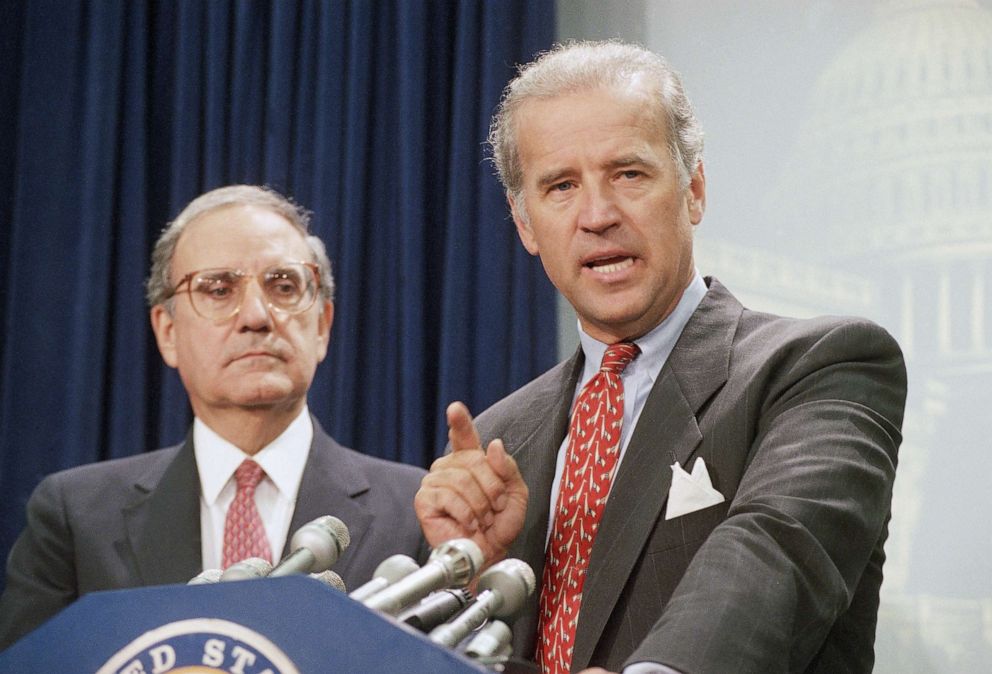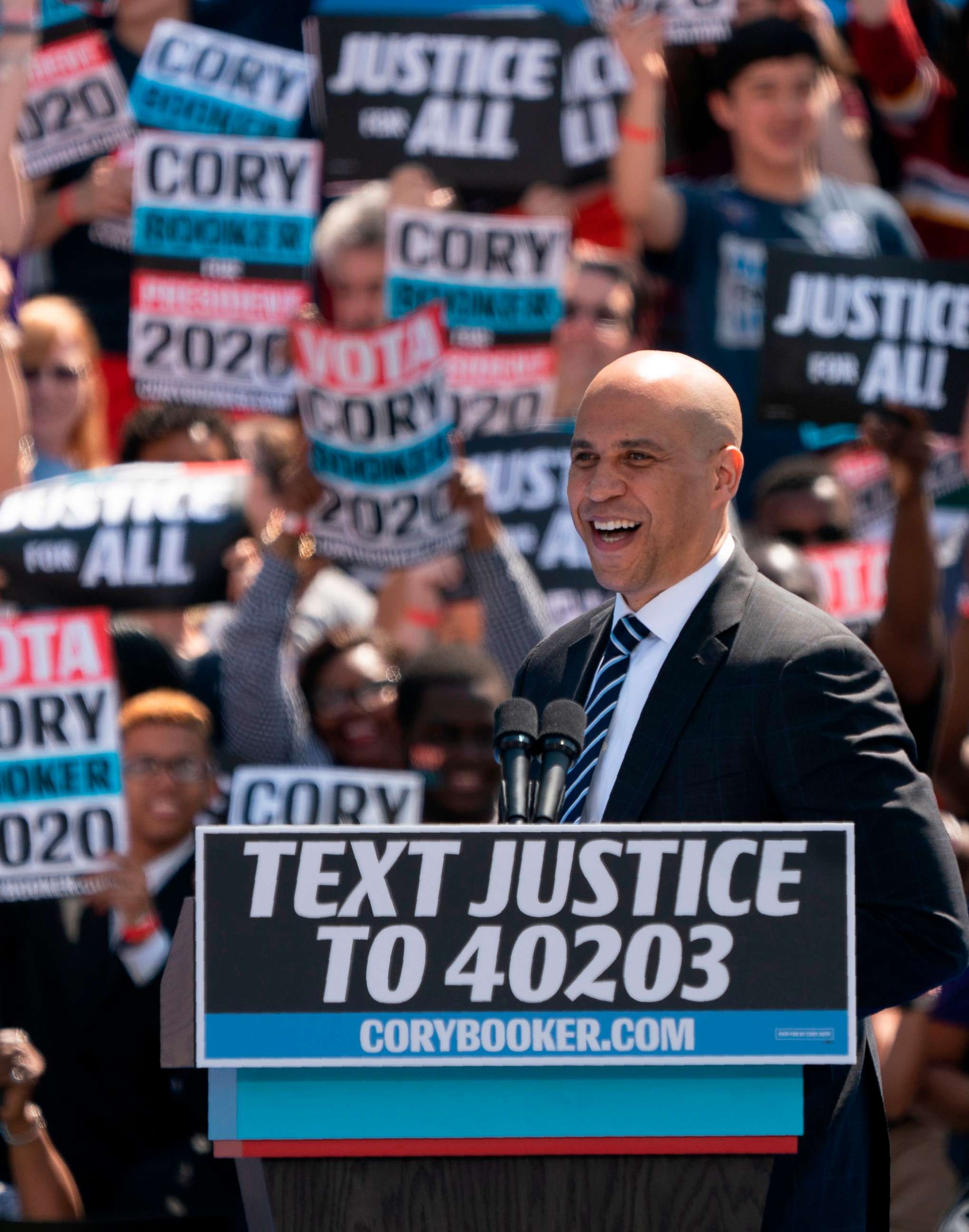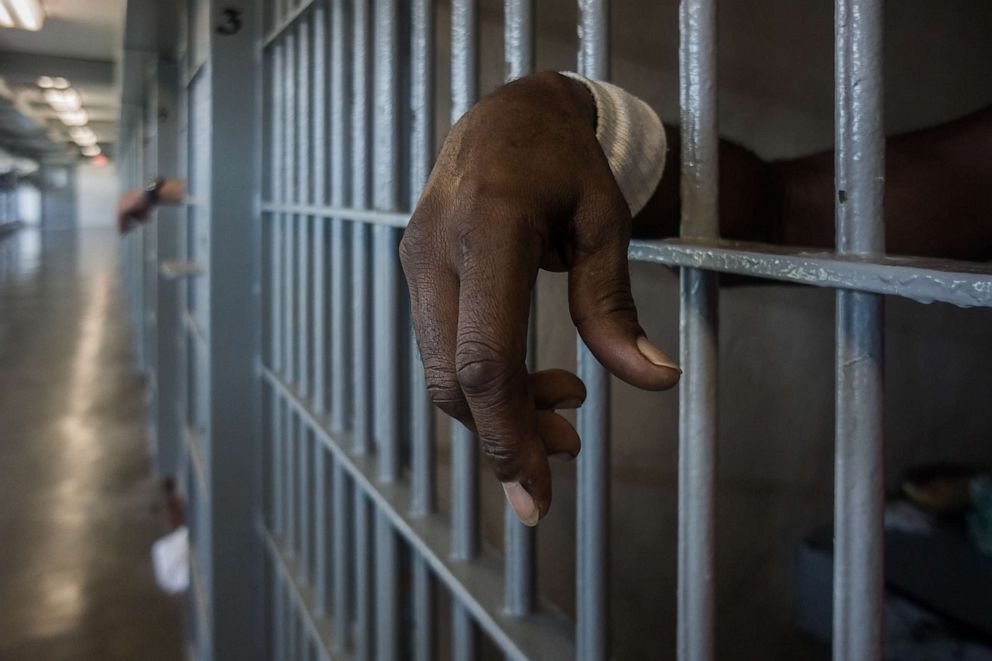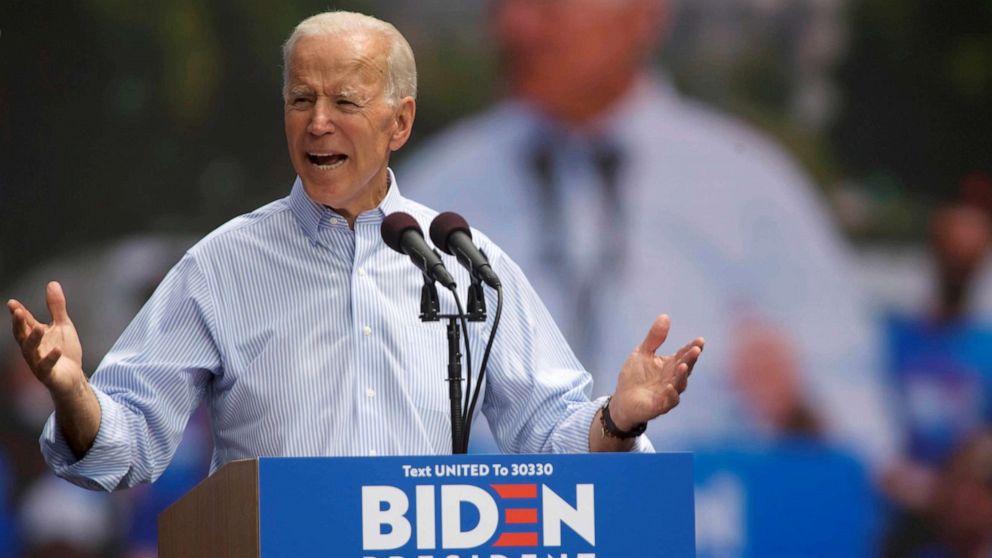Biden's key role in 1994 crime bill attacked by both Trump and Democrats
Earlier this month, standing in the rain before a crowd of Granite State voters at a house party in Nashua, New Hampshire, former Vice President Joe Biden defended his role in a signature piece of legislation he shepherded through Congress more than two decades ago -- a sweeping, bipartisan 1994 crime bill that has turned into a looming hurdle in his presidential bid -- and a target for President Donald Trump.
The key complaint Trump has seized on -- voiced by African American critics and some of Biden's 2020 Democratic rivals -- is that the measure led to mass incarceration of blacks, especially young men.
In fact, across the country the incarceration rates in the years leading up to the passage of the 1994 crime bill had already begun to see a steep rise beginning in the early 1980s, according to the Sentencing Project and data from the federal Bureau of Justice Statistics.
Still, it's a claim Biden has already attempted to debunk on the campaign trail.
"Folks, let’s get something straight," he told the crowd in Nashua on May 14. "This idea that the crime bill generated mass incarceration, it did not generate mass incarceration."
This latest flash point in the Democratic presidential race, formally known as the Violent Crime Control and Law Enforcement Act, was signed by President Bill Clinton in 1994 and was a comprehensive response to the country's rising violent crime rate.
Provisions in the law included paying for new federal prisons if states agreed to force offenders to serve 85% of their sentence as opposed to allowing them out early on parole; providing tens of billions of dollars to put 100,000 more police officers on the streets by paying for two-thirds of the new officers' salaries in participating cities; instituting a federal "three strikes" rule, which mandated harsher sentences up to life in prison for defendants who had committed a third felony after being convicted in state or federal court of two previous felonies -- at least one of which was serious or violent; and funding crime prevention programs. Other notable components included: an assault weapons ban, the removal of education grants for inmates, and the Violence Against Women Act.
The “three strikes” rule -- implemented in varying degrees by states as well, California being the harshest -- was among the most controversial aspects of the law because it mandated lengthy prison terms even for less serious crimes if the defendant was a repeat offender.
The former Delaware senator has said that while he "had to accept" President Clinton's "three strikes" rule, mass incarceration was a result of "states setting mandatory sentences."
But Biden's pivotal role in getting the bill passed, as chairman of the Senate Judiciary Committee, is facing new scrutiny.

"Anyone associated with the 1994 crime bill will not have a chance of being elected," Trump tweeted Tuesday morning. "In particular, African Americans will not be able to vote for you. I, on the other hand, was responsible for Criminal Justice Reform, which had tremendous support, and helped fix the bad 1994 Bill!"
"Super Predator was the term associated with the 1994 Crime Bill that Sleepy Joe Biden was so heavily involved in passing. That was a dark period in American History, but has Sleepy Joe apologized? No," he said in another tweet, although it was then-first lady Hillary Clinton in 1994, not Biden, who used the term "superpredator" in support of the law.
Despite his tweets, Trump himself has used similar language. In his 2000 book "The America We Deserve," the then-New York real estate magnate referred to perpetrators as "predators.”
Trump appears to be hoping to drive a wedge between Biden and African American voters, whom the former vice president needs to clinch the Democratic nomination and take on the incumbent president.
But with more than 500 days until Election Day and months of campaigning in the early voting states ahead, a more immediate concern for Biden would seem to be the broader potential disapproval of his past record by voters from within his own party -- after a slate of other Democratic presidential candidates openly disparaged the 1994 crime bill in recent weeks.
"That 1994 crime bill, it did contribute to mass incarceration in our country," California Sen. Kamala Harris said earlier this month at a campaign stop in New Hampshire, contradicting Biden's New Hampshire comments, according to the Associated Press. "It encouraged and was the first time that we had a federal three strikes law," Harris said. "It funded the building of more prisons in the states. So, I disagree, sadly."
New York Mayor Bill de Blasio, on CNN's "State of the Union" Sunday, also blamed the bill for the upswing.
"That crime bill was one of the foundations of mass incarceration in a very painful era in our nation's history," he said.
"The (former) vice president and anyone else has to be accountable for every vote they take and what's on their record, and I think that was a huge mistake," he added.
"I think the incarceration did so much harm that I would think that even those who were behind the ’94 crime bill — or at least many of them — would do it differently if they had a chance to do it again," Mayor Pete Buttigieg of South Bend, Indiana, told the Washington Post on May 23.

"As President of the United States, your job is to pursue justice and what we see right now is so many folks suffering," New Jersey Sen. Cory Booker said during a CNN town hall on March 27. "I passed a comprehensive criminal justice reform bill, with other senators on both sides of the aisle, the first time since those horrible crime bills back in the 1990s, passed this legislation working across the aisle to move forward."
Vermont Sen. Bernie Sanders, another 2020 competitor who sits in second place in most polls of the Democratic primary so far, also voted for the 1994 bill. He is the only other candidate among the current filed of Democratic hopefuls who was serving in Congress at the time.
The crime bill was the highest-profile piece of legislation confronting violence during the tough on crime era.
In the years since the bill became law, the incarceration rate in the United States has reached new record-breaking highs: from 1991 to 1998, the rate of incarceration rose from 313 to 461, per 100,000 population, an increase of 47% despite a decreasing crime rate, according to a report by the Sentencing Project.
The law, criminal justice reformers now say, perpetuated a false narrative that "locking up and throwing away the key" would undercut crime. It instead, continued an upward trajectory of incarceration.
"Mass incarceration did not start with a '94 crime bill, the country was on an upward trajectory," Kara Gotsch, Director of Strategic Initiatives at the Sentencing Project told ABC News. "Criminal Justice reformers, point to it, in particular, because of the incentives it provided to states through financial incentives to build more prisons if they implemented truth and sentencing policies."

"Certainly the crime bill, both symbolically and practically, did contribute to mass incarceration and I absolutely agree that Joe Biden had a big role in the passage of that bill," she continued. "He articulated very much the rhetoric, the tough on crime rhetoric of the day, and he is responsible for perpetuating that false narrative of why that locking up and throwing away the key was somehow going to save, you know, stop drug use and, and prevent crime."
Despite Biden appearing to suggest that states held most of the responsibility for mass incarceration in New Hampshire, since the 1994 crime bill he helped author only applied to federal law and not at the state level, the tough on crime rhetoric espoused by top leaders of government at the time trickled down to the states and influenced their policymaking with federal funding.
"There's blame to go around to everyone. The federal government, in the 1990s, certainly, under the Clinton administration, really prioritized the message of tough on crime," Gotsch said. "We had many years, many presidential administrations calling for tough on crime ... all our money went into police, putting more police on the ground, increasing the number of arrests, putting more communities of color, in jeopardy and putting them behind bars ... They have a much louder microphone than the people who are at and the state local level so they do share in the blame for mass incarceration."
"Federal policymakers helped contribute to the growth of mass incarceration, using funding to encourage states to increase arrests, prosecution, and imprisonment. The 1994 Crime Bill, for example, incentivized states to lengthen prison sentences and build prisons,” Inimai Chettiar and Priya Raghavan, both at the Brennan Center for Justice, wrote in a report published earlier this month.
ABC News' Molly Nagle, Meghan Keneally, Chris Donovan and Meridith McGraw contributed to this report.




